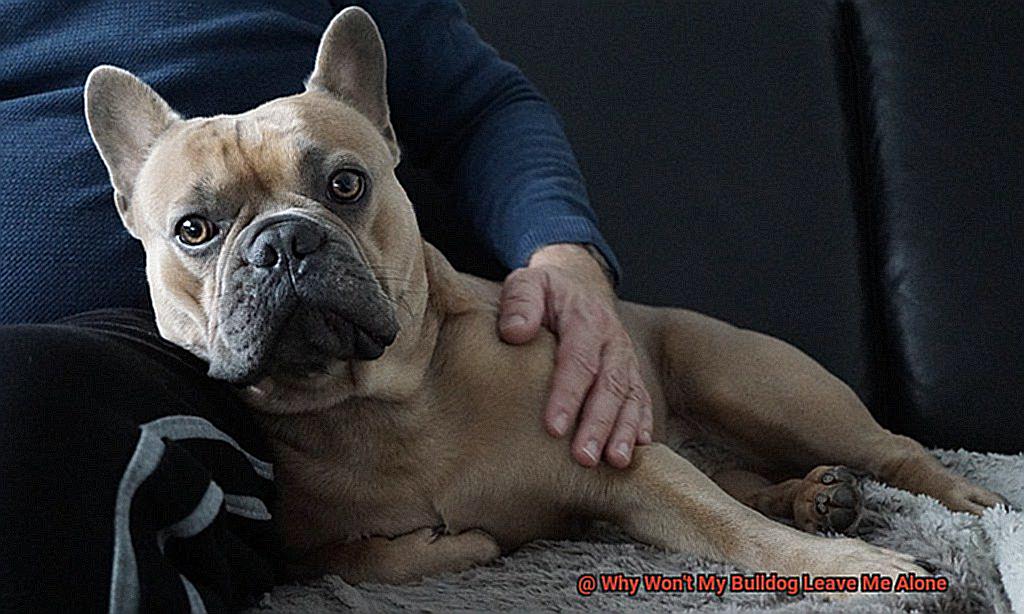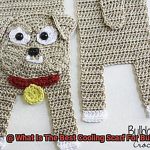Why Won’t My Bulldog Leave Me Alone?
Do you have an adorable bulldog who won’t leave you alone? No matter where you go, your pup is right there with you? If so, don’t worry – many bulldog owners are facing the same issue.
It can be frustrating to have a clingy dog, but it’s important to understand why they act this way. In this blog post, we’ll discuss the reasons behind your bulldog’s attachment to you and provide tips for dealing with their behaviour.
We’ll look at how genetics, climate, and socialization all play a role in their clinginess. Plus, we’ll share ways to set limits without being too harsh on your pup.
Finally, we’ll explore how to help them become more independent while still showing them love and care. If you want to know why your bulldog won’t leave you alone, read on.
With a better understanding of the reasons behind this behaviour, it’s possible to have a happier relationship with your four-legged companion.
Attention Seeking Behavior in Bulldogs
Contents
- 1 Attention Seeking Behavior in Bulldogs
- 2 Separation Anxiety in Bulldogs
- 3 Bulldogs Bonding Closely with Their Owners
- 4 Signs of Imprinting on a Bulldog
- 5 How to Tell if Your Bulldog is Seeking Attention or Suffering from Separation Anxiety
- 6 Strategies for Dealing with Attention-Seeking Behavior in Bulldogs
- 7 Strategies for Dealing with Separation Anxiety in Bulldogs
- 8 Tips for Preventing Bulldog Imprinting
- 9 Conclusion
Bulldogs are known for their loving and loyal nature, but when they become too clingy or needy, it can be difficult to get anything done.
So why do Bulldogs have such strong attention-seeking behavior? Boredom, anxiety, or even a lack of interest could be the cause.
To properly address this issue, as a responsible owner, it is important to understand the root cause of their behavior. To prevent Bulldogs from getting bored, they need mental stimulation to keep them engaged.
Offering them toys, puzzles, and interactive games can help keep them occupied and discourage attention-seeking behavior. Additionally, Bulldogs may become anxious if they are left alone for extended periods of time and may try to locate their owners in the hopes of preventing separation.
It is essential for Bulldog owners to recognize that these dogs thrive on attention and affection; however, too much can be overwhelming.
Separation Anxiety in Bulldogs
Separation anxiety in bulldogs is a common issue that can cause distress and destructive behavior.
Bulldogs are highly social animals, so it’s no surprise that they become anxious when left alone for extended periods of time. To ensure your bulldog’s overall wellbeing and prevent unwanted behaviors, it’s important to identify the source of their separation anxiety and find the most suitable solution.
To start, make sure your bulldog’s basic needs are met, including nutritious food, regular exercise, and mental stimulation. Additionally, if there have been any significant changes in their environment or routine, such as moving to a new location or a change in work schedule, take some time to adjust to the new routine and provide plenty of love and reassurance during this transition period.
Finally, provide your bulldog with a comfortable and familiar space where they can relax without feeling anxious or worried; this could be a crate or a designated room where they can rest peacefully while you’re away.
Bulldogs Bonding Closely with Their Owners
Bulldogs are renowned for their strong attachment to their owners, and it’s not unusual for them to follow their owners around the house or even try to sit on their laps.
This level of bonding is rooted in their breed history, which includes being bred as companion dogs. Bulldogs were originally developed in England as bull-baiting dogs, but when that practice became illegal, they were bred as companion dogs instead.
This purpose shift resulted in bulldogs being treated with unconditional love and affection, which has made them a breed renowned for its loving and devoted nature. This devotion and loyalty can be seen in the strong bonds that form between bulldog owners and their pets.
Bulldogs may become anxious when separated from their owners, and they may follow them around to stay close by. To ensure this behavior is managed properly, it’s important to provide your bulldog with plenty of attention and exercise.

Signs of Imprinting on a Bulldog
Bulldogs are known for their loyalty and affection, and the bond between a bulldog and its primary caretaker is often attributed to imprinting.
During the critical period of socialization, usually between three and twelve weeks of age, puppies form a strong attachment to their primary caregiver through the process of imprinting. This will have a significant impact on the puppy’s behavior and temperament.
If you believe your bulldog has become imprinted on you, here are five signs to look out for: 1.
Following you everywhere
If your bulldog follows you from room to room and never leaves your side, it could be a sign of strong attachment. 2.
Seeking physical contact
Imprinted bulldogs are often very affectionate and seek out physical contact with their primary caretaker. If your bulldog is always trying to cuddle with you or snuggle up to you on the couch, it may be a sign of imprinting.

Separation anxiety
Bulldogs that are imprinted on their primary caretaker can develop separation anxiety when left alone.
They may become agitated, destructive, or vocal when their human is not around. 4.
Protectiveness
Imprinted bulldogs can be very protective of their primary caretaker and may become aggressive or defensive if they perceive a threat to their human – even if the threat is not real.
It’s important to maintain a consistent routine for your bulldog in order for them to feel secure in their environment.
How to Tell if Your Bulldog is Seeking Attention or Suffering from Separation Anxiety
Bulldogs are known for their affectionate nature, and they can become attached to their owners quickly. But when is it too much? It’s important to be able to differentiate between attention-seeking behavior and separation anxiety in bulldogs so they receive the care and attention they need.
First, observe your bulldog’s behavior when you are not around. If they become destructive, chew on furniture or other objects, or soil the house, those could be signs of separation anxiety. However, if your bulldog behaves well when left alone and only exhibits clingy behavior when you are around, the issue may be related to attention-seeking behavior.
Next, observe their behavior when you spend time with them. If your bulldog follows you around and wants to be near you at all times without showing any signs of distress when you leave, then it’s likely that they are just seeking attention. However, if your bulldog becomes distressed or anxious when you try to leave, this indicates separation anxiety.
It’s essential to remember that bulldogs are social animals that thrive on companionship and affection. Seeking attention is a natural behavior for them; however, it’s important to set boundaries and not reinforce their clingy habits by constantly giving in to their demands for attention.
Strategies for Dealing with Attention-Seeking Behavior in Bulldogs
It’s important to recognize the difference between attention-seeking behavior and separation anxiety so you can provide your Bulldog with the care they need without sacrificing your sanity.
If they are always following you around and being clingy, it’s important to set boundaries and enjoy their love without reinforcing this behavior. Attention-seeking behavior is a common issue in Bulldogs.
It could be due to boredom, anxiety, or simply because they enjoy being close to their owners. Fortunately, there are several strategies that pet owners can use to help manage it.
Providing more mental and physical stimulation through games and daily exercise will help them burn off their excess energy. Creating a designated space for them to retreat to when they need some alone time can also alleviate any stress or anxiety that may be contributing to the behavior.
Finally, establishing routines for meals, fitness, playtime, bedtime, and awakening will let the dog know what to expect and when to expect it.
Strategies for Dealing with Separation Anxiety in Bulldogs
Separation anxiety is a common problem among many breeds of dogs, including Bulldogs.
It can manifest in destructive behavior, excessive barking or crying, and even physical symptoms such as vomiting and diarrhea. But don’t worry; with the right approach, you can give your pup the love they crave while still preserving your sanity.
Creating a calm environment for your Bulldog is key to success. Set boundaries and provide plenty of mental and physical stimulation to keep them occupied.
Designate alone time for your Bulldog, provide them with plenty of toys and distractions to keep them entertained, reward good behavior with treats and encouraging words, and gradually increase the amount of time they are left alone. If needed, consult a veterinarian or dog behavior specialist for professional help and guidance.
With patience and consistency, you can help your Bulldog overcome their separation anxiety and become a more independent and confident pooch.
Tips for Preventing Bulldog Imprinting
Bulldogs have a strong tendency to become deeply attached to their owners, which can cause behavioral issues and separation anxiety for both the dog and the owner. To prevent bulldog imprinting, it is important to establish boundaries and routines early on in their lives. Here are five tips to help you discourage bulldog imprinting:
Establish Boundaries
Bulldogs are social animals and love spending time with their owners, but it is essential to set clear boundaries to avoid over-dependence. Start by allowing your bulldog some alone time and gradually increase the amount of time apart.
Encourage Independent Play
Provide your bulldog with toys that promote independent play – this will not only help prevent imprinting but also keep them mentally stimulated and content.
Avoid Over-Praising
While positive reinforcement is an important part of training, over-praising your bulldog can lead to excessive clinginess. Instead, try praising them sporadically while emphasizing rewards for good behavior.
Practice Separation
Gradually teach your bulldog to be comfortable with short periods of separation – start by leaving them in a separate room for a few minutes, then gradually increase the duration until they are used to being alone for longer stretches of time.
Avoid Constant Attention
Bulldogs love attention, but too much can lead to imprinting – try providing a routine that includes alone time and independence from their owner.
BmVSLqCh-RI” >
Conclusion
Bulldogs, renowned for their close bond with humans, can be difficult to understand when they won’t leave us alone.
Fortunately, understanding the reasons behind this behavior is the key to a happier relationship. Genetics, climate, and socialization can all play a role in why your Bulldog is clingy; however, attention-seeking behavior and separation anxiety are two of the most common causes.
To address these issues effectively, provide your pup with plenty of mental stimulation and physical activity as well as a safe place where they can relax when left alone. In addition, set boundaries and establish routines to help them become more independent while still showing them love and compassion.
Finally, if you suspect your Bulldog has imprinted on you, there are techniques pet owners can use to help with the situation.




